- Home
- Greg Keyes
Chosen of the Changeling Page 10
Chosen of the Changeling Read online
Page 10
Eruka grinned back at that. “Woti talks for me, sometimes. I can do a few songs like that—a very few. But you have to know the ins and outs of the original song before you can change it, and I know none about deer.”
“Rabbits? Elk?”
“None of those,” Eruka allowed.
Perkar nodded glumly. “We go back empty-handed, then.”
“So we do,” Eruka agreed.
They were not the only ones empty-handed; Apad had had no success, either. Ngangata and Atti, however, had a fine buck hung up by its rear legs, skinning it. Atti was already offering blood to the local forest god and to the Lord of Deer, as well.
“Well shot,” Eruka told Atti.
Atti shrugged. “Ngangata killed him; I was just there to drag him back.”
“Just the same,” Perkar said, “I’m glad somebody brought fresh meat back. Another day of bread …”
“How much more of this, anyway?” Apad asked, gesturing at the forest around them. “It’s been six days since we left the last damakuta behind.”
“And tomorrow it shall be seven,” Atti replied. “And the day after, eight. This is no jaunt up to your summer pasture, Apad.”
“I know that,” Apad said testily. “I just want to know how much longer.”
Atti glanced at Ngangata. The half Alwa turned steady eyes on Apad. “Another eight or nine days, depending upon the weather,” he said.
“How long before we enter the territory of your kin?” Apad inquired, unable to resist a faint sneer on the word “kin.”
“The Alwat don’t count me as kin any more than you do,” Ngangata retorted. “And we’ve been in their territory for five days now.”
“Five days? Where are they?”
Ngangata shrugged. “If any are around here, they are avoiding us. The only signs I’ve seen have been many days old.”
“Signs? What signs?”
“Footprints. Tools, a few shelters.”
Apad frowned. “I’ve seen none of that.”
Ngangata shrugged noncommittally, emphasizing his relative lack of neck. “I suppose you haven’t.”
“What does that mean?” snapped Apad.
“I just repeated what you said,” Ngangata rejoined softly.
Apad scowled. He stalked over to the bloody deer carcass, examined it with his fists resting on his hips. “You probably talk to them while we are asleep, don’t you? Did they kill this deer for you?”
Ngangata stopped skinning, looked down at his own feet for a moment. Then he walked over to his bundle of things, picked up his bowstave, and strung it.
“What will you do with that?” Apad asked. “That isn’t a man’s weapon.” Perkar saw that his friend was trying to affect an easy, haughty attitude; but he also saw that his muscles were tight, corded—Apad was tense, worried, ready to reach for his sword or dash aside. He was afraid of the halfling. And why not? A warrior would not shoot another over an insult—challenge him to combat perhaps, but not simply murder him. But who could tell what this kinless creature might do?
“It isn’t a warrior’s weapon,” Ngangata agreed. “I am not a warrior.” With that, he snapped a black-feathered shaft onto his string; for him, the motion seemed as easy as stretching at daybreak. The bow bent and sang; the little man’s body somehow bent, too, bow and arm aid back together. Perkar wasn’t sure exactly how it was so graceful—and certainly he could not do it himself.
Down came the arrow, a bird impaled upon it.
“If you are worried about where the deer came from,” Ngangata told Apad, “there is your meat.”
The Kapaka, sitting at some distance from the rest of the group, chose that moment to come and join them. He clapped Apad on the shoulder.
“Best we have a fire to roast this on, eh, Apad?” he said.
Apad stood a bit longer—to give the impression of reluctance, Perkar thought—and then left to gather wood. After a moment, Perkar followed to join him.
We all fear Ngangata, he mused. We don’t like him because we are afraid of him, afraid of what he might do. He remembered a favorite saying of his father’s:
There is little real hatred in the world
Only Fear prancing in a man’s clothes
The next day they left the rich lowlands behind, began ascending the hills. Ngangata led them through winding valleys, thick with laurel and hickory and, finally, higher up, white birch. The ways became steeper and steeper, but Perkar remained amazed that they made any progress at all, without trails and in such rugged country. The land pleased him, despite its wildness; he imagined how it would look in pasture, how well suited the ridge there on the right would be for a damakuta and its outbuildings. Oh, it would be far and far from his father’s lands, but it would be his. It would be far from her, too, and that thought hung about him, a clinging mist of melancholy. He considered, once again, that perhaps it would be better, after all, to marry Bakume’s daughter, if only so he could remain close to the goddess.
But no, he knew better than that. He could not have her. The best he could do was to give her a gift, a gift that she would remember in a thousand years, when he himself was the ash of a memory. His heart tightened on the thought of that gift, squeezing out other dreams, damakutat and pasture. Around him, the land lost its promise and luster, became merely trees and bushes.
His reverie was interrupted when the party halted. Knowing that he had missed something, Perkar glanced around him, searching for the cause of their delay. Nightfall was still some time away, and he saw no stream where they could water the horses.
“Who built this?” the Kapaka wondered, and it was then that the forest around Perkar came back into focus, reasserting its presence in his mind, if not his heart.
Near them stood the ruins of a damakuta. Perkar had ridden straight past the remaining timbers of its stockade, mistaking them for dead trees. The building itself had not been lived in for many years; the cedar shingles were nearly all gone, leaving the skeleton of the roof to bleach and wither in the sun and rain. The walls were collapsed, too, here and there, but whoever had built it had laid a firm foundation, for the frame still stood. The beams were entire trees, stripped of bark.
Inside, ferns and moss ran riot. The six dismounted and walked carefully through the ruin, searching for any sign of its inhabitants. Eruka began a little song to frighten off ghosts.
“What happened to them, do you think?” Apad asked of no one in particular, running his palm up the shaft of a support pillar.
“This wasn’t their place, that’s what happened,” Ngangata answered. “They took from the Forest Lord without asking.”
“How do you know that?” Eruka asked, interrupting his own song.
Ngangata shot the young man a clearly puzzled look. “Have you seen other damakutat? The Forest Lord has never granted Human Beings land this far into the forest. This is Alwat territory. The land is for them.”
“To what end?” Apad growled. “I see no pasture, no fields, no fine houses. To what end do the Alwat use this land?”
Ngangata shook his head as if at a child. “That is no concern of ours. The Forest Lord does what he will with his land, gives it to whom he wishes.”
Perkar frowned. “My great-grandfather bargained with a local god—not the Forest Lord. Perhaps these people did the same.”
“Then where are they?” Atti asked, sweeping his hands around.
“They might have built elsewhere,” Perkar suggested.
Atti shrugged. “Might. Might and a stone is just a stone.”
“This once I agree with the half man,” Eruka muttered. “This is no concern of ours. Let us be gone before the ghosts of these people waken.”
The Kapaka was more stubborn than that, but not much. “We’ll leave a cup of woti for the ghosts of men, burn incense for the women. This is the least we can do, for whoever they were.”
Perkar helped the others make the preparations hurriedly, kindling a small fire to provide coals for the incense and to
warm the woti so that it could be smelled by the ghosts. Eruka sang the “Thanking Ghost Song,” but even his fine voice could not hide his worry—indeed, he fairly flew through the last seven stanzas. Much too quickly really. It was well past midday when they mounted back up. Atti was the last on his horse; he dug through the packs on his second animal and brought forth a chain-mail shirt.
“Why that?” Apad asked. “Afraid of the ghosts?”
“Not the ghosts,” Atti said. “Just a feeling.”
A little chill ran up Perkar’s spine, and after a moment’s hesitation, he shifted his weight into his left stirrup, preparing to dismount and don his own armor. A frown from Apad stopped him, though. It was as if the other man had simply said, “Show the hill man that you aren’t afraid.” And so he stayed in his saddle. But he made sure that his sword was within easy gripping reach; he tied it across his saddle horn, where it had been for the first week of their journey, when Perkar still entertained some notion that he might need it. Now he entertained that notion again.
The damakuta was still in sight, but just barely so, when Eruka whispered, “See? See there?” Perkar stood in the stirrups and looked back the way they had come. A little curl of smoke from the incense was still visible; it would go out soon. And there, near it, crouched four figures, or shadows of figures. Eruka, between Perkar and the apparitions, had his eyes shut now, was reciting something low and quick. Perkar nudged Mang into a trot
“Hsst,” the Kapaka said. “No. It would be rude to flee from them. Ride slowly, don’t look back. They will not follow.”
Nevertheless, as the shadows grew longer and deeper, Perkar felt uncomfortable about his back. His spine seemed to believe that it was turned toward something dangerous, something darker than the shadows and more sinister than ghosts. Perhaps the apparitions were not ghosts at all but tiskawal, perpetually starving spirits who hungered after Human spirit and blood. He didn’t voice his fears, for they seemed silly. He had seen more than a few ghosts in his life, and those back at the abandoned damakuta had looked and behaved normally enough.
Mang and the other horses shared his disquiet, though, nickering and stamping, rolling their heads about. Ngangata and Atti seemed even more watchful than usual, their necks craning, gazing up into the trees and down to the steadily thickening underbrush.
“Someone cleared this once,” the Kapaka observed of the dense growth. “See how there are no large trees, how closely the saplings grow? This was once pasture.”
Ngangata agreed. “It will likely get thicker. We should circle around this; they can’t have cleared much.”
“Too much. Far, far too much.” Apad’s voice sounded sharp and accusing. “They cleared and they burned. They killed my children and they never asked me if they could.”
Perkar actually chuckled. Apad had pitched his voice so solemnly, so seriously, and yet the sentiments were not his at all. He was clearly mocking Ngangata’s earlier remarks, speaking singsong, the way gods were supposed to, sometimes …
Perkar turned then and glimpsed the awful thing that spoke: a dark, hideous head perched atop a body something like a cat’s, but much like a man’s as well.
The real Apad gaped for an instant, then cursed and shrieked simultaneously. His horse reared and screamed horribly, as if imitating his master. The panicking roan crashed into Mang, smashing into Perkar’s right leg. Pain lanced up through his thigh, and then Mang reared, dumping him beneath the roan’s furiously pawing hooves. The ground came as a shock, like the slap in the face the goddess had given him before he left. His lungs sucked tight, and he could not draw air for a long, painful moment. He had barely the presence of mind to fold his arms around his head, seeking some protection against the iron-shod hooves.
Fortunately, for him, Apad brought himself and his beast into some semblance of control, and so Mang calmed in turn, despite the thing facing them, the thing that had spoken in Apad’s voice. Gasping and moaning, Perkar struggled to a crouch.
His companions had all dismounted; their horses would not stand still enough to sit upon. Eruka and Apad brandished swords and Atti gripped his long-handled axe. The Kapaka had no weapon drawn, but his hand rested firmly on the hilt of his sword. Ngangata was just looping his bowstring into place.
“Steel,” Apad’s voice came from a rippling slit in a head like a black, rotten pumpkin. “You’ve come back. I just blink—take the merest nap—and there you are again, with your steel.” The head seemed to grin; its eyes were knobs of deeper black, with no whites, pupils, or lids. Its teeth, Perkar thought, were much like a cat’s and so indeed was its body; the monster squatted on a lion’s rear legs, for certain. But the forearms, oddly thin for such a massive creature, looked very Human. Or Alwat. It was still, moving nothing but its mouth.
Eruka stammered at the god. “A-Aniru,” he began. “We have not met you before. We don’t know your song, or how to honor you. If you could te … teach us …” He trailed off as the thing cocked its head speculatively at him.
Perkar felt his shock-induced calm begin to vanish; he was close to shaking, closer still to running as fast as he could. He knew of gods—they were all around, in each tree and stone—but all of the ones he had ever known were tame, and the only one he had ever seen, in manifest form, was her. This was a Wild God, and Perkar knew nothing of them. Or rather, he knew only one thing: that he feared them.
“If you dislike our steel, come no closer,” Apad warned, but his words rang flat and unbelievable.
“Aniru,” the Kapaka said. “We had no wish to trespass nor to do damage in your domain. We only pass along here, going to the home of the Forest Lord in the mountain. We have business with him.”
The head quivered. It spoke, this time in Ngangata’s voice. “I know of no Forest Lord. I know only of your kind, what you bring with you, steel. Now I think I will eat you, shit your steel out with your bones. Your ghosts may go on to see this ‘Forest Lord.’”
The Kapaka reluctantly drew his sword, as well. “We mean no harm here.”
“Like you meant no harm when you cut down my trees and built your wooden cave? Yes, I know what you mean by that.”
“That wasn’t us,” Eruka complained. “Ngangata, speak to it!”
The halfling had an arrow nocked. “It is a mad god,” he said. “Wild and mad. What would you have me say?”
“Tell it we are leaving here.”
Strange words trickled from Ngangata’s lips, weird short syllables, strangely songlike.
“I thought you had a different scent,” the god remarked, when Ngangata was done. “Your kind respect me. You may go, if you wish.”
The god leapt at them, springing from its haunches without warning. Perkar scrambled wildly to his feet, seeking Mang and his sword.
The Wild God reached Atti first, and one of Ngangata’s arrows already stood in an opaque eye. Atti met the monster with a downstroke; his axe thudded into the bunching sinews between neck and shoulder. Then Atti went down beneath the thing’s weight. Perkar reached Mang, who was rearing again. He had to take his eyes off the battle for an instant, long enough to grab the hilt of his sword and pull out the long, sweet blade. From the corner of his eye, Perkar saw Ngangata calmly launching another shaft. Eruka stood as if frozen.
When Perkar turned again, the god was in midleap, poised above Apad. Apad shrieked and stabbed, shielding his face with his left arm. The blade seemed to go in, but it made little difference to the black apparition, which scrambled on past him toward the Kapaka. Miraculously, before it could reach him, it staggered, an arrow impaling the roof of its mouth and exiting between its eyes. The Kapaka stepped sharply back, then hammered his sword down, cut into the melonlike head.
Perkar was surprised to find himself in motion, screaming, sword raised. A long, dark, Human-fingered hand darted at him, and he brought his sword down from his shoulder, crossing his chest with the blade. The steel met the black limb near the wrist; it was like chopping into a stone, and the hilt rang in his
hand, numbing it. The Kapaka stepped in again, and again, his heavy sword carving slivers of god-flesh from the monster’s neck and head. Behind, Atti struggled to his feet, chest smeared with red blood. Perkar recovered and stroked his sword onto the squirming backbone. Then Atti was there, axe descending in a blow better designed to split wood than for combat. It hewed into a rear leg and severed it.
Perkar would never hear another sound like that; he would later call it a howl, knowing that such was no description for a noise that burrowed all the way into his bones. The god flipped back toward Atti, who had fallen along with his axe. Still screaming, it thrashed about on the ground.
“Up!” Ngangata yelled, still loosing arrows. “Up and ride! We cannot kill it, we can only flee.”
The Kapaka seemed to know the truth of that; he was already gripping his saddle, preparing to mount. Atti struggled to his feet again, leaving a snail-trail of blood on the leaves behind him. Eruka stood, blank-eyed, until Perkar grabbed him by the arm and shoved him toward his horse. Then Perkar was scrambling onto Mang. Apad was already mounted. Ngangata stayed a moment longer than they, placing three more arrows in the god—Perkar saw shafts protruding neatly from each eye. Then they were all fleeing on the thunder of horses’ hooves. Perkar leaned onto Mang’s neck, urging the animal faster.
“He was sleepy,” Ngangata howled, from behind them. “Sleepy and slow. But he is awake now!”
“The other horses! Our packs!” Apad yelled back.
“No!” the Kapaka returned. “I forbid it. Leave them!”
Leaves and branches lashed at them, as if by their own will. The six riders fought their way over one ridge, then a second. When would they leave this god’s territory and enter another? Apad’s words were finally penetrating. Kutasapal was still back there, back with that black monster. Perkar very nearly wheeled Mang around then. He only truly owned three things: his sword, Mang, and Kutasapal. If he left Kutasapal, he owned only two. And he had discovered something in himself, something he never knew he had. When his sword struck the god for the first time, when it reached for him—all of his hesitation, his fear had dwindled, replaced by something … large. Something like anger or fury but colder, harsher. Brighter. His desire had been to hit the god again and again, until it died or his sword broke. Now … why hadn’t he?

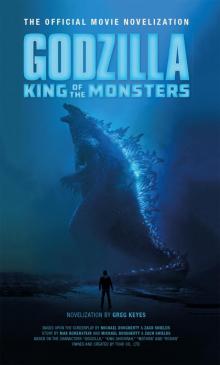 Godzilla
Godzilla Godzilla vs. Kong
Godzilla vs. Kong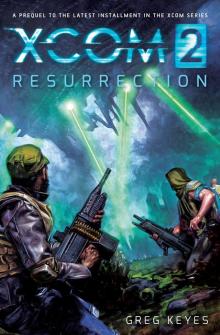 XCOM 2- Resurrection
XCOM 2- Resurrection Independence Day: Crucible (The Official Prequel)
Independence Day: Crucible (The Official Prequel)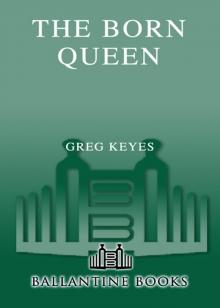 The Born Queen
The Born Queen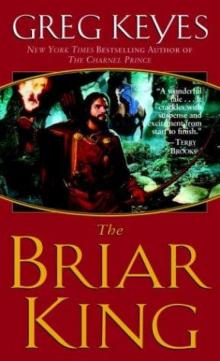 The Briar King
The Briar King Star Wars The New Jedi Order - Dark Journey - Book 10
Star Wars The New Jedi Order - Dark Journey - Book 10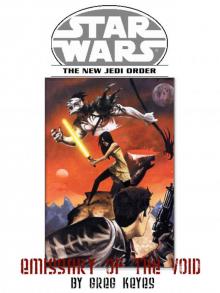 Star Wars: New Jedi Order Book 8b: Emissary of the Void
Star Wars: New Jedi Order Book 8b: Emissary of the Void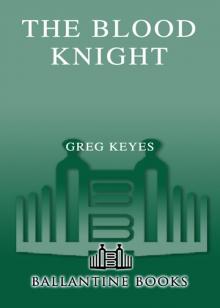 The Blood Knight
The Blood Knight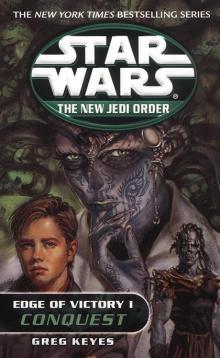 Star Wars - Edge of Victory - Book 1: Conquest
Star Wars - Edge of Victory - Book 1: Conquest Edge of Victory 2 Rebirth
Edge of Victory 2 Rebirth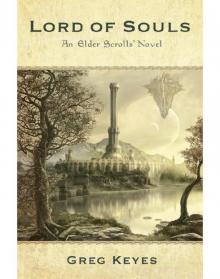 Lord of Souls: An Elder Scrolls Novel
Lord of Souls: An Elder Scrolls Novel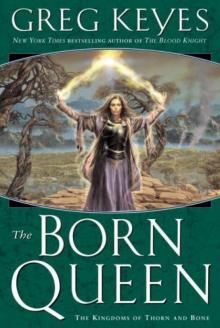 The Born Queen tkotab-4
The Born Queen tkotab-4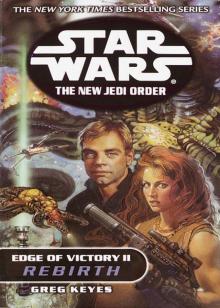 Rebirth: Edge of Victory II
Rebirth: Edge of Victory II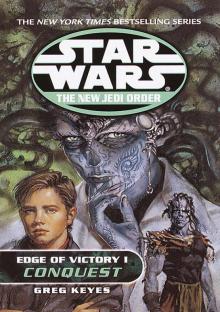 Conquest: Edge of Victory I
Conquest: Edge of Victory I Emissary of the Void
Emissary of the Void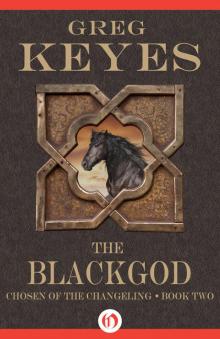 The Blackgod
The Blackgod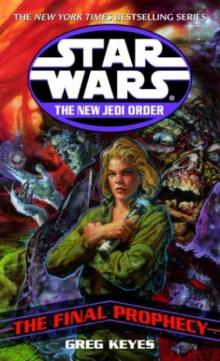 Star Wars The New Jedi Order - The Final Prophecy - Book 19
Star Wars The New Jedi Order - The Final Prophecy - Book 19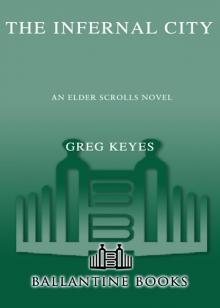 The Infernal City
The Infernal City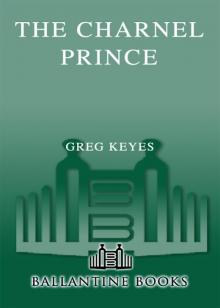 The Charnel Prince
The Charnel Prince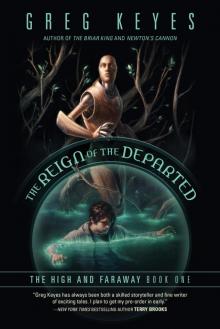 The Reign of the Departed
The Reign of the Departed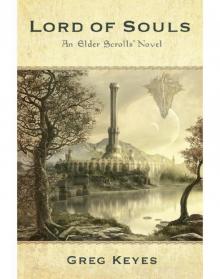 Lord of Souls es-2
Lord of Souls es-2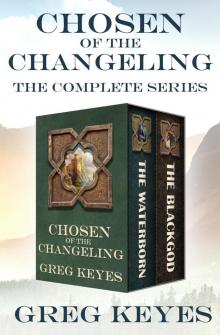 Chosen of the Changeling
Chosen of the Changeling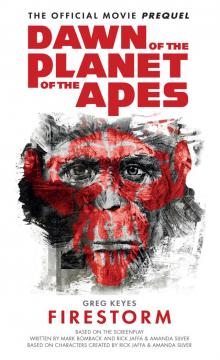 Dawn of the Planet of the Apes
Dawn of the Planet of the Apes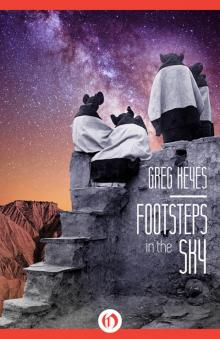 Footsteps in the Sky
Footsteps in the Sky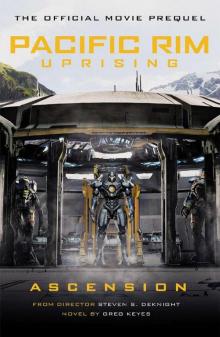 PACIFIC RIM UPRISING ASCENSION
PACIFIC RIM UPRISING ASCENSION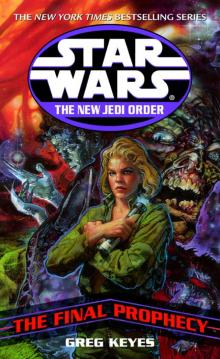 The Final Prophecy: Edge of Victory III
The Final Prophecy: Edge of Victory III